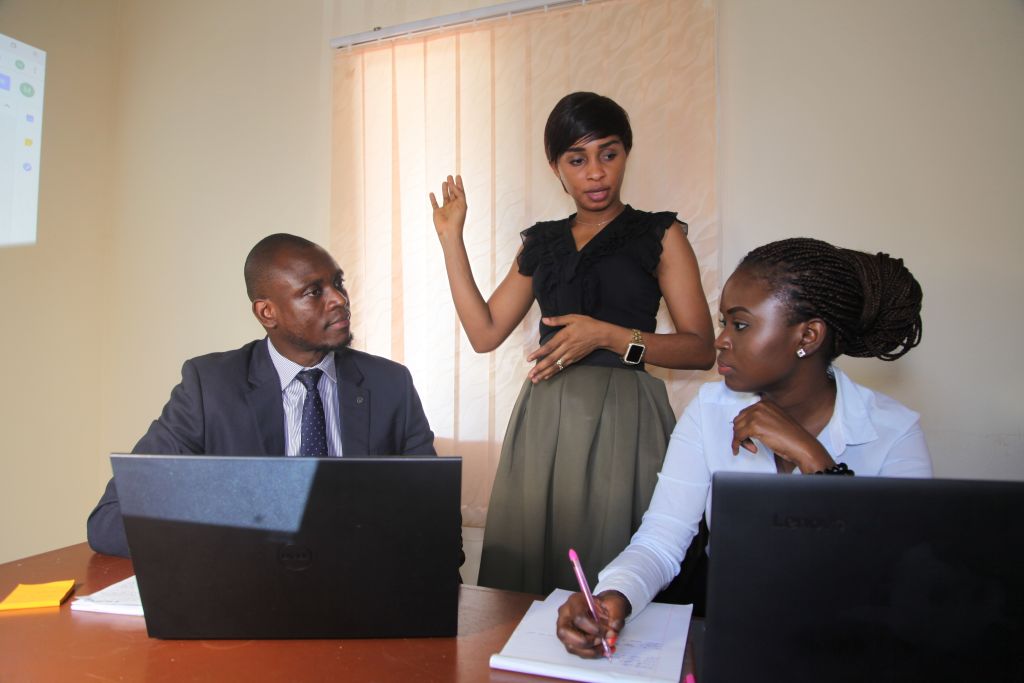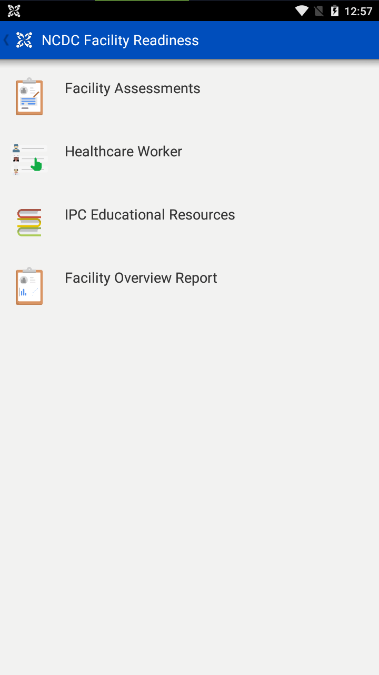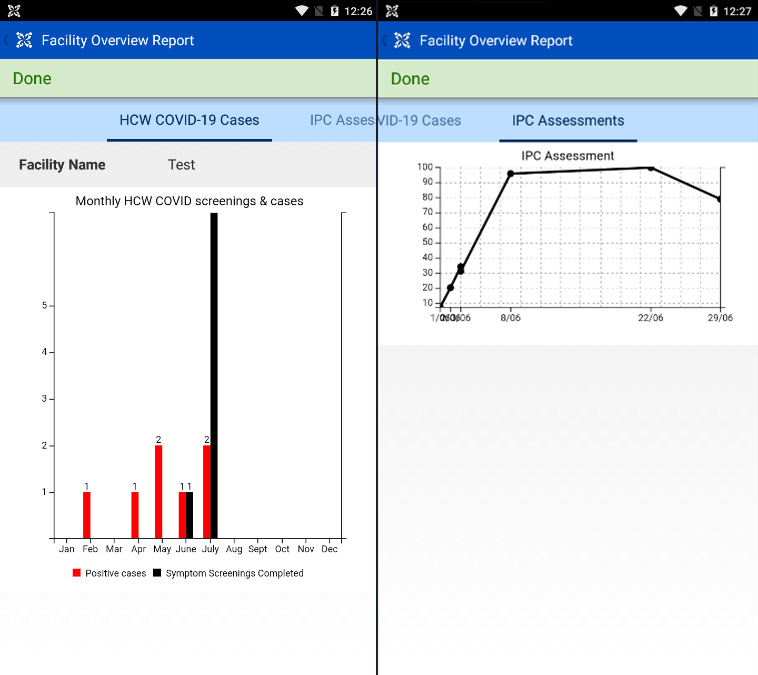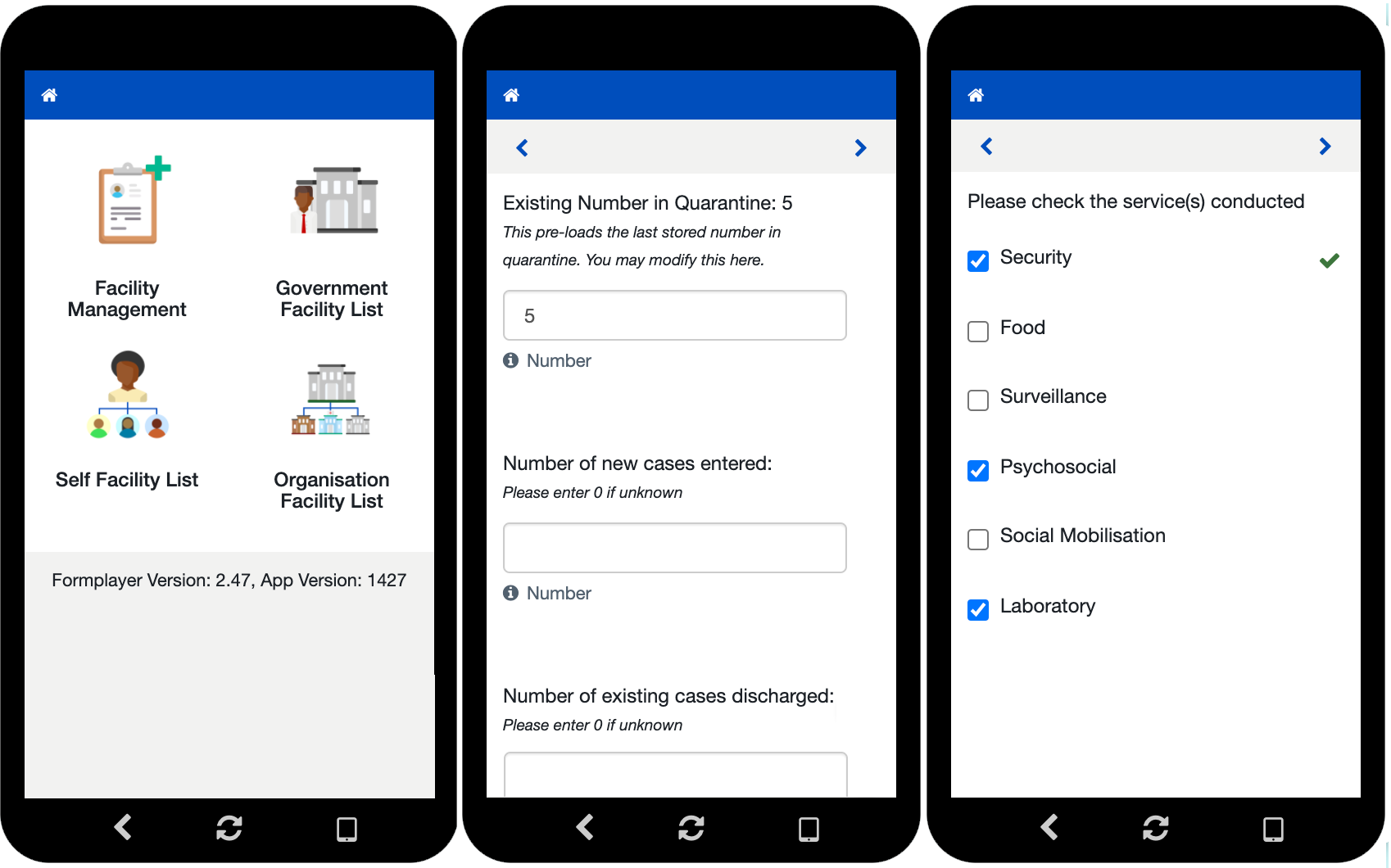Supporting COVID-19 Response Across Africa

From a new COVID-19 Local Response System in the United States to a comprehensive set of template applications, Dimagi has been hard at work developing tools and strategies to combat the spread of COVID-19 around the world.
Now, with the virus continuing to spread across the continent, we’re partnering directly with NGOs and ministries of health across Africa to help implement CommCare for everything from workplace screening to facility readiness and contact tracing.
Adapting existing programs for COVID-19 response – Kenya
As confirmed cases of coronavirus continue to rise across Kenya, Lwala Community Alliance is developing a COVID-19 Digital Toolkit to support their direct pandemic response efforts. Lwala’s Community Health Workers (CHWs) have been using CommCare for over 3 years to enable community-level health service provision and continuous data collection through household visits. With guidance from Dimagi, they built out a new CommCare application that includes tools for COVID-19 outreach.
The initial application launch includes a daily self-check form to continuously ensure the safety of CHWs, a phone screening form that will enable CHWs to assess the status of their households prior to conducting in-person visits, and a clinical gate screening form that screens patients for COVID-19 symptoms and exposure prior to accessing service areas at hospitals and partner facilities.
As the pandemic progresses, Lwala will assess the needs of their service population on an ongoing basis. Should the need arise, they plan to deploy additional application components, potentially including forms to enable contact tracing and community-based rapid testing. Utilizing this toolkit will allow Lwala to conduct safe, responsible COVID-19 outreach and serve their clients while ensuring the safety of their CHWs and clinical staff.
Preparing Facilities for COVID-19 Response – Nigeria
Nigeria was the first sub-Saharan African country to identify a positive COVID-19 case, with the first in-country case being confirmed in late January 2020. Since then, the reported transmission has remained relatively low with confirmed cases reaching 42,689 and 878 deaths as of July 31st.
Back in early June, Dimagi partnered with the CDC Foundation and the Nigeria CDC to produce a facility readiness application for the response to COVID-19 at the tertiary and secondary health facility levels. Once completed, this application will first be deployed for a pilot period in three tertiary health facilities, previously identified as centers of excellence in infection prevention and control (IPC) in areas surrounding Abuja.
Contingent on the successful implementation of the initial pilot and the incorporation of any user feedback, the project plan is to expand to additional facilities throughout the country.
This application is designed to comprehensively support the IPC focal person in their role to achieve overall facility readiness in the effort to combat the COVID-19 Pandemic. The application provides support through three integral modules in the following ways:

- Facility Assessment: This module provides the user access to a routine IPC facility assessment in the form of a specialized checklist, as well as a history of previous assessments and their scores.
- Health Worker: In this module, the user is able to register all health care workers (HCWs) at their facility, follow up with routine symptom screenings, and further investigate the individual factors leading to an HCW testing positive for COVID-19.
- IPC Educational Resources: A module providing a general hub of education materials to support the IPC focal person in implementing specialized COVID-19 facility protocols and best practices.
A primary objective of Nigeria’s CDC’s facility readiness application is to ensure all facilities that they support are sufficiently prepared with resources and processes to fully address the increasing burden on the health care system while also ensuring an overall low transmission of COVID-19 to HCWs. To best facilitate the monitoring of the facility and HCW status, this application provides the IPC focal person with real-time mobile reporting metrics, allowing them to make data-driven decisions on facility protocol improvements and identify areas of strength or those that require improvement.

Comprehensive COVID-19 Response as a Gateway to Health System Strengthening – Sierra Leone
The first cases of COVID-19 came relatively late in Sierra Leone, not appearing until 31 March. But with the Ebola epidemic too recent in memory, the nation has reacted swiftly. To some extent, the government is able to draw on structures put in place during that crisis – for instance, a sophisticated technical response division created during the Ebola epidemic is our main partner for COVID-19 response.
Luckily, the country’s case rate has remained relatively low so far, with just over 1,900 confirmed cases and 69 confirmed deaths as of early August. However, as everywhere, this rate is likely to be much higher due to limited testing – and in Sierra Leone in particular, suspicion of medical facilities is rampant in the communities and presents a challenging sociocultural angle to the response.
Dimagi has partnered with the Sierra Leonean Government’s Directorate of Science, Technology, and Innovation (DSTI), a team of technologists and public health experts who work closely with the Ministry of Health and Sanitation and other key departments.
Together, we are rapidly rolling out multiple products to tackle different angles of the pandemic. Each tool was developed centrally and meant scale, beginning with teams of dozens of district officials and key facility staff:
- A checklist app to assess facility readiness
- A quarantine compliance application to track service delivery across formal and informal quarantine sites
- Additional applications to support broader patient- and facility-level case management and tracking medical supplies

Dimagi is also supporting DHIS2 integrations and data dashboards across a diverse network of local partners, as sophisticated data use is of the highest priority. This engagement also presents the possibility of developing further interventions to support non-COVID community and facility work, which would mark an important transition from pandemic response to long-term system strengthening.
A key focus of this partnership is the desire for local ownership and sustainability. The Sierra Leonean government team has demonstrated a profound commitment to developing a central suite of interventions with a single set of tools, an attention to coalition-building, and an unwavering regard for the post-COVID world. All the officials Dimagi has worked with have lived and worked through the horrors of Ebola, and the unstated mantra is that this will be a very different outcome.
Dimagi’s team continues to manage overlapping development cycles and navigate the transition from launch to sustainable development, this project sees Dimagi working side-by-side with a highly-competent technical government team with an unwavering commitment to success – a partnership that is rarer than it should be in mHealth interventions today.
Supporting Workplace Screening with CommCare – South Africa
The South African Government implemented a strict lockdown beginning in March. Since easing the lockdown, the number of the cases has risen a great deal while offices have begun to reopen. As workers began to return to the office, Dimagi worked with an iNGO with offices in South Africa to equip them with a workplace screening and contact tracing solution.
Each day before entering the office, employees complete a symptom and risk assessment in their CommCare application. Based on their responses to the screening questions, the application provides guidance on whether they are at high risk of having COVID-19. If they are, the application advises them not to enter the office and SMS messages are automatically sent to the company’s COVID compliance officers to flag the risk. Each day, at the beginning and end of the workday, scheduled reports that detail who was in the office are sent to the management team.
This application has allowed this iNGO to open their South African offices with confidence, knowing they will have insight on who was in the office, when, and how they were feeling.
Piloting Digital Contact Tracing – Zambia
Despite shutting down all educational institutions and putting restrictions on foreign travel early on, the first COVID-19 cases were recorded in Zambia in mid-March. Since then, the number of cases has steadily grown, and as of mid-August, there have been slightly more than 8,000 cases of COVID recorded throughout Zambia.
As the first few cases were identified in Zambia, CommCare was identified as a potential tool to use for contact tracing and immediately Dimagi, an iNGO, the Ministry of Health and Zambia National Public Health Institute began working to adapt the CommCare FFX Contact Tracing template application to meet their unique needs.
Over the following months, the application was modified to incorporate their unique case investigation and testing workflows. Following a successful pilot in a sub district in Lusaka, the tool has begun a phased scale-up.
For more information on how CommCare is being used for COVID-19 response, click here.
Share
Tags
Similar Articles
Tackle Africa - The CommCare Grant Awardee on Transitioning from Paper to Digital
Explore the impactful work of Tackle (formerly TackleAfrica), a renowned NGO leveraging football to deliver HIV and Sexual & Reproductive Health & Rights (SRHR) information and services to young people across Africa, and learn about their transition from paper to digital data collection through the CommCare Research Grant.
Dimagi Partner Blog
April 19, 2024
Amplifying Early Childhood Development with CommCare: FCW's Digital Transformation
The FCW Early Childhood Development program provides home visitors with training on how to leverage CommCare for digital transformation
Dimagi Partner Blog
April 11, 2024
World Poultry Foundation’s guide to Implementing a Self-Service Digital Solution
Learn how the World Poultry Foundation addressed challenges in collecting real-time data from the field. Explore their journey to find an affordable, sustainable mobile digital solution and gain valuable insights along the way.
Dimagi Partner Blog
January 26, 2024